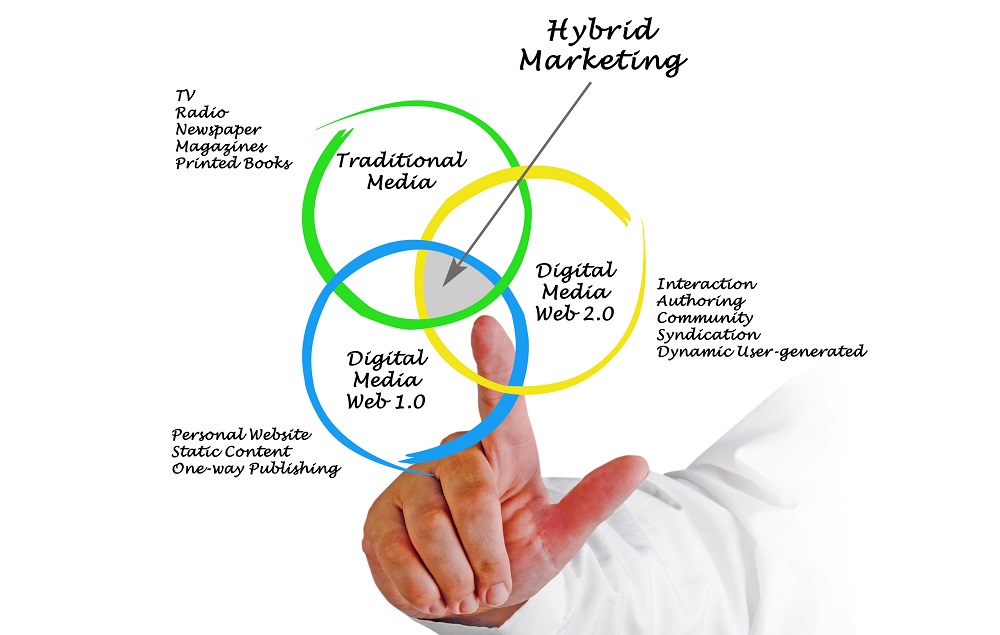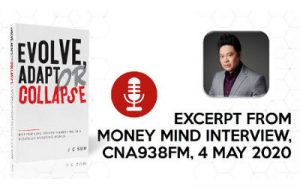Hybrid marketers can learn from creative entrepreneurs as they both have several things in common.
Hybrid marketing is the understanding of both traditional and digital marketing, applying hybrid strategies and tactics to engage and connect with customers in a digitally evolving world.
As discussed in a previous blog entry, a Burning Glass Technologies study reported that in marketing and public relations, hybrid marketers need a combination of right-brain thinking (creative design) with left-brain thinking (analytics and data analysis) to succeed. They are creative designers and analysts rolled into one[1].

Creative entrepreneurs are very similar in the sense they are both creative and have business savvy. In simple terms, a creative entrepreneur is a person who sets up a business for profit in a creative industry. In essence, creative entrepreneurship is where passion and profit meet. This is different from a pure creative artist or hobbyist who engages in a creative passion for fun.
In his book, “The Creative Economy: How People Make Money from Ideas“, John Howkins, defines creative entrepreneurs as people who “use creativity to unlock the wealth that lies within themselves” rather than external capital.
Being a creative entrepreneur requires knowledge and a skill set beyond just expertise in the chosen creative field or the ability to create an original product. It requires you to derive commercial value out of your expertise, brand and creative product.
Mark McGuinness expounds on this point in his article “The 3 Critical Characteristics of the Creative Entrepreneur” from LateralAction.com, “The value they create lies not in their physical products (if any) but in intangible assets such as their brand, reputation, network and intellectual property. They are adept at projecting a desired image and creating a personal brand, both online and offline. They also understand the principles of intellectual property law and use copyrights, trademarks, patents and licenses to exploit the full potential of their ideas.”
In today’s economy and business environment, it is not possible to be just a creative artist.

A creative entrepreneur must be just that, a creative individual coupled with entrepreneurial skills. You will need to learn business and financial management and equip yourself with sales, PR and marketing skills.
In his article, “The Death of the Artist – and the Birth of the Creative Entrepreneur” published in The Atlantic, William Deresiewicz, highlighted how the image of the artist has changed from the “hard-working artisan, solitary genius to credentialed professional”. He notes the importance of creative entrepreneurship as reflected by the curriculum of several universities where creative arts and design students have to study entrepreneurship as well as their respective creative practice.
There is a saying in the entertainment business. An entertainer is in show business. So, an entertainer must work on the show as well as the business. And because business is spelt twice as long as show, you need to put in twice the amount of effort in the business. This directly applies to the creative entrepreneur as well.
It is a delicate balancing act that is not without compromise at times. You must have as much passion for your creative field as you have the drive to build your business and brand as a creative entrepreneur.
The desire for making money must not overshadow your love for your creative passion. At the same time, you must work towards being well paid for what you are worth. Balance is key to ensuring commercial success and longevity as a creative entrepreneur.
Hybrid marketers, by nature, have a creative part to them, which makes them equally adept in both traditional and digital marketing.
[1] Sigelman, Matthew ; Bittle, Scott; Markow Will; Franic, Benjamin, “The Hybrid Job Economy: How New Skills Are Rewriting the DNA of the Job Market“, (Jan 2019). Burning Glass Technologies.

TRAITS OF SUCCESSFUL CREATIVE ENTREPRENEURS
Here is an adapted list of five common traits of successful creative entrepreneurs from art advisor, Aletta de Wal’s, original list of traits of successful fine artists. Theses traits apply equally to hybrid marketers.
Their Creative Passion is the Core of their Lives
Successful creative entrepreneurs wake up and go to sleep thinking about their creative passion. They carve out time in their day making art or marketing it. (In fact, for these creative entrepreneurs, there seems to be no clear distinction between the creativity of making and marketing.) If they have a full-time job, it is secondary in their minds to creative passion and mostly a means to an end. Their real job is being a creative entrepreneur.
Award-winning graphic designer & founder of ‘JUST™ Creative’, Jacob Cass declares on his blog, “My life is design, I love it, and I surround myself in it every day.”
Successful Creative Entrepreneurs Understand How Business Works in their Creative Industry
Successful creative entrepreneurs understand the entrepreneurial aspects of being a creative entrepreneur. From business management to managing cash flow and creating synergy between the creative product and sales, marketing, PR and branding efforts; successful creative entrepreneurs are multi-skilled individuals.
Sophie Andrews, author of The Creative Collection, in an article written for Huffington Post “The 5 Biggest Profit Secrets for Creative Entrepreneurs” correctly assesses that “rather than focusing on the business side of their enterprise, creatives are often more inclined to sacrifice their financial security at the altar of their artistic integrity. They invest their time, capital, and energy in an unbalanced manner that all too often results in the failure of businesses positively overflowing with unrealized potential.
To unlock this potential, you’ll need the key, which is a business structure built upon organized, unshakeable financial foundations.
The world of business moves at an incredibly fast pace with new ideas and new trends emerging constantly. Add to that the global financial crisis, the emergence of new markets of competitors, and the rising cost of raw materials, and it becomes apparent that the creative who wants to succeed and be recognized needs to understand precisely what this business climate demands.”
Successful Creative Entrepreneurs have a Strong Work Ethic
Successful creative entrepreneurs manage themselves, their creative energy and resources. They balance the time to produce their creative product and to market it. Successful creative entrepreneurs are consummate professionals. They do not let their emotion affect their work.
They are disciplined and hardworking, working relentlessly on both their creative passion and the business of their creative enterprise.
Successful Creative Entrepreneurs are Resilient
Successful creative entrepreneurs know that success does not happen overnight; it requires working hard, working smart and a bit of luck. Creative entrepreneurs understand that mistakes and failure are part of the business and part of life. When they make mistakes, they focus on solutions, not on regrets.
In his article, “How to Increase Your Art’s Market Value and Make the Most of Your Career as an Artist” from Artbusiness.com, Alan Bamberger, stresses the importance of being resilient, “… continue creating art no matter how difficult the process becomes. Continue even though you’re not selling anything. Continue even if you’re dissatisfied with what you’re producing. Persevere, work through the tough times and you’ll be glad you did.”
Successful Creative Entrepreneurs Do Not Spend Time with Negative People
Successful creative entrepreneurs limit their time and emotional involvement with people who are negative, especially if they are not supportive of their careers and offer no value, knowledge or skills.
They recognize false adulation and instead crave for constructive criticism so that they can improve themselves. They do not surround themselves with “friends” who attempt to pull them down when they achieve success, out of envy, conspiracy or competitive feelings.



